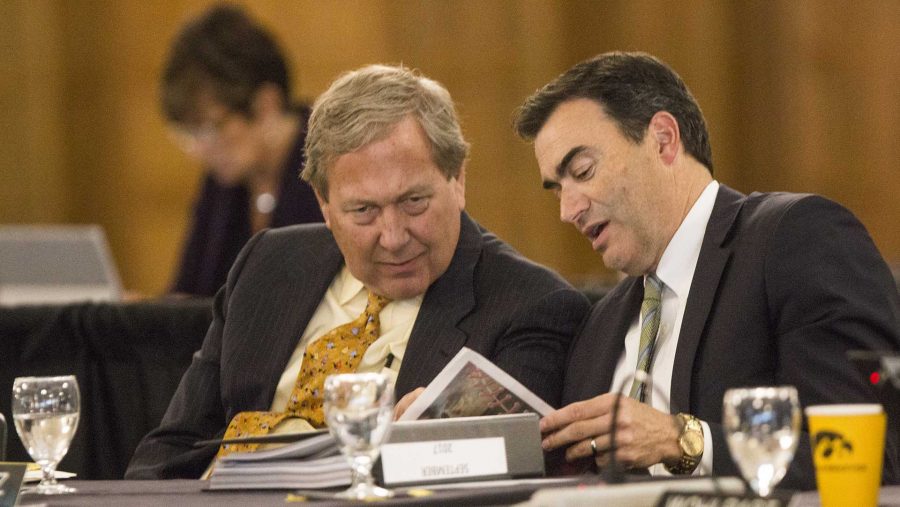After raising tuition consistently, the University of Iowa’s fiscal 2017 revenues still fell short of projections in the budget the state Board of Regents approved in 2016.
According to regents’ documents, the UI’s revenues fell $13.56 million short of the regents’ approved budget, leading to an equal loss in expenditures.
RELATED: UI wrestles with budget
Brad Berg, the regents’ policy and operations officer, said fiscal 2017 was challenging with midyear state funding reductions of approximately $21 million in response to a shortfall of state tax revenues in addition to a growth of more than 1,800 students between the three regent institutions — Iowa State University, the University of Northern Iowa, and the UI.
For the UI, the loss in appropriations amounts to $9.2 million.
“It’s an ongoing concern,” UI Senior Vice President for Finance and Operations Rod Lehnertz said during the regents’ Investment and Finance Committee meeting Wednesday. “The state appropriated $44 million less in 2017 than the university received in 2009.”
Revenue from tuition and fees totaled $453.8 million, which was $6 million less than expected, according to regents’ documents. This was largely because of the higher number of resident students versus nonresident students enrolled in the first-year class. 39 percent of the UI’s gross tuition revenue came from resident students and 61 percent from nonresident students.
RELATED: UI takes measures to limit enrollment in Class of 2021
Despite the loss, fiscal 2017 has been the UI’s highest-earning year in the last five years with revenues totaling $740.2 million.
One of the largest of the UI’s expenditures is faculty salaries, which UI President Bruce Harreld has previously said are a top priority for the institution. 67 percent of the expenses from the general operating fund are related to salary and benefit costs, exceeding the budget by 0.4 percent.
Lehnertz noted there was a $4 million reallocation from collegiate administrative units to correct market-based shortcomings for faculty, which led to retention issues for top faculty.
“While that happened, there were few or minimal increases elsewhere which is not a sustainable practice,” Lehnertz said.
RELATED: University of Iowa wrestles with retaining faculty
The budget also had an excess of $6.5 million in the area of student financial aid. According to regents’ documents, this was largely from significant growth in the Summer Hawk Tuition Grant program during summer 2016.
However, the UI announced in February it would change the Summer Hawk Grant starting summer 2017 so students could take no more than six semester hours during the summer session; students were previously allowed to enroll in up to 12 semester hours.
The change was fueled not only by hopes of saving money after the appropriations reduction, but also student outcomes — UI officials have said it was not uncommon for students enrolled in more hours to drop a course or earn lower grades.



